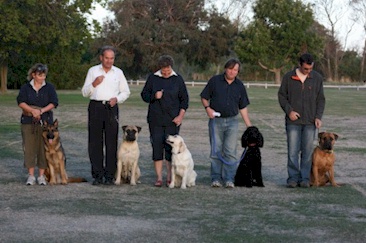|
Generally puppies will stay in
puppy classes until six months of age and then progress through the various
levels to grade 5 or 6. Some breeds may learn faster than others and some
handlers will have previous experience in training dogs which is a great
advantage when training subsequent dogs.
Obedience Trials
You may become hooked on obedience training after attending an affiliated Club
and your dog has successfully graduated from Grade 5 or 6 and achieved it's
basic obedience certificate.
Your interest may then extend to pursuing this hobby to higher levels which
involves competing in Obedience Trials. Obedience trials are held most weekends
and test your dog's ability to obey and understand the commands which you have
taught the dog at the training Club.
Titles and certificates are awarded after the dog successfully qualifies three
times at each level and these titles are then added to the dog's name.
The first level is the Community Companion Dog class which includes heel on
lead, stand, recall and stays. The Title CCD is awarded to the successful dog.
The second level is the Companion Dog class which includes heel off lead, stand
for exam, recall, retrieve and stays. The Title CD is awarded.
The third level is the Companion Dog Excellent class which includes heel free,
drop on recall, retrieve on the flat and over a jump, broad jump or signals and
out of sight stays. The title CDX is awarded.
The fourth level is the Utility Class. Only the top obedience dogs reach this
level which includes seek back lost article, directed jumping, scent
discrimination, silent heel work and signals, food refusal or speak or directed
retrieve and stays. The title of UD is awarded. If a dog achieves 5 further
qualifications of 185 points or more an Obedience Champion title is awarded.
The newly introduced Utility Dog Excellent class includes seek back with decoy,
positions in motion, scent discrimination with Judges scent, directed sendaway
and recall, distance control, multiple retrieves and temperament test. The title
UDX is awarded.
As you can see, taking you dog to obedience classes can develop into an
interesting life long hobby which can give both dog and handler a great deal of
pleasure and form a close bond between them.
Obedience Clubs
Should you decide to take your dog to an Obedience Club there are 23 affiliated
Obedience Clubs situated in the Adelaide metropolitan area and most major
country areas that offer puppy training through to competition standard
training.
If you currently don't own a dog but have had previous experience in dog
training and have some spare time available, you may also become involved with
these Clubs Instructing or helping at Committee level.
For a full list of Obedience Clubs in your area refer to 'Affiliated Clubs'
Content © 2007
SA Canine Association
Incorporated |
